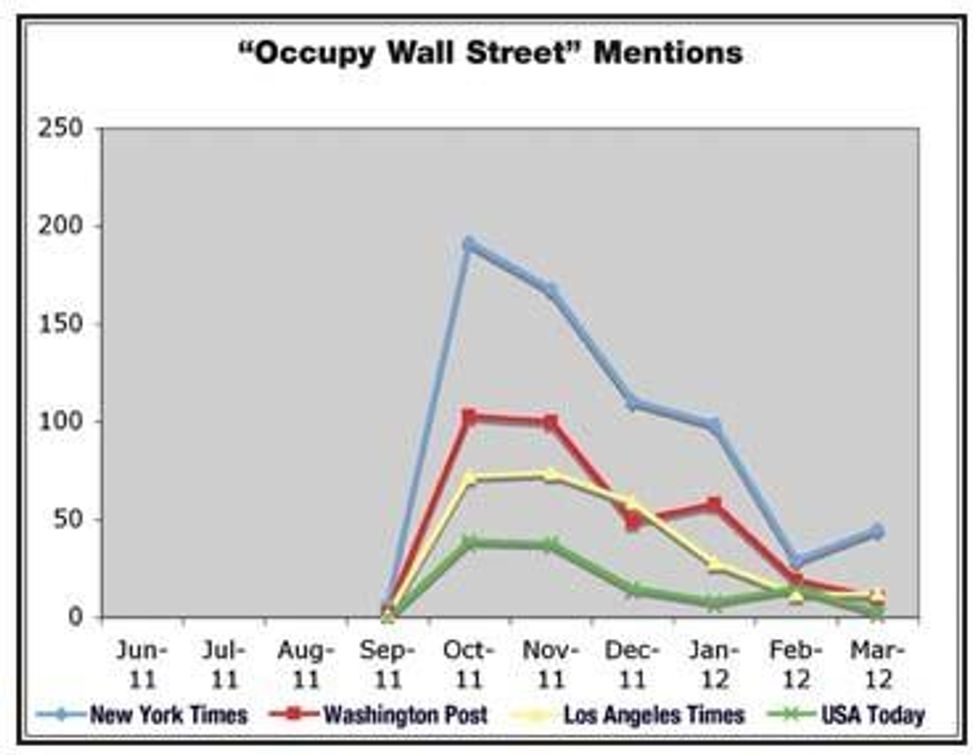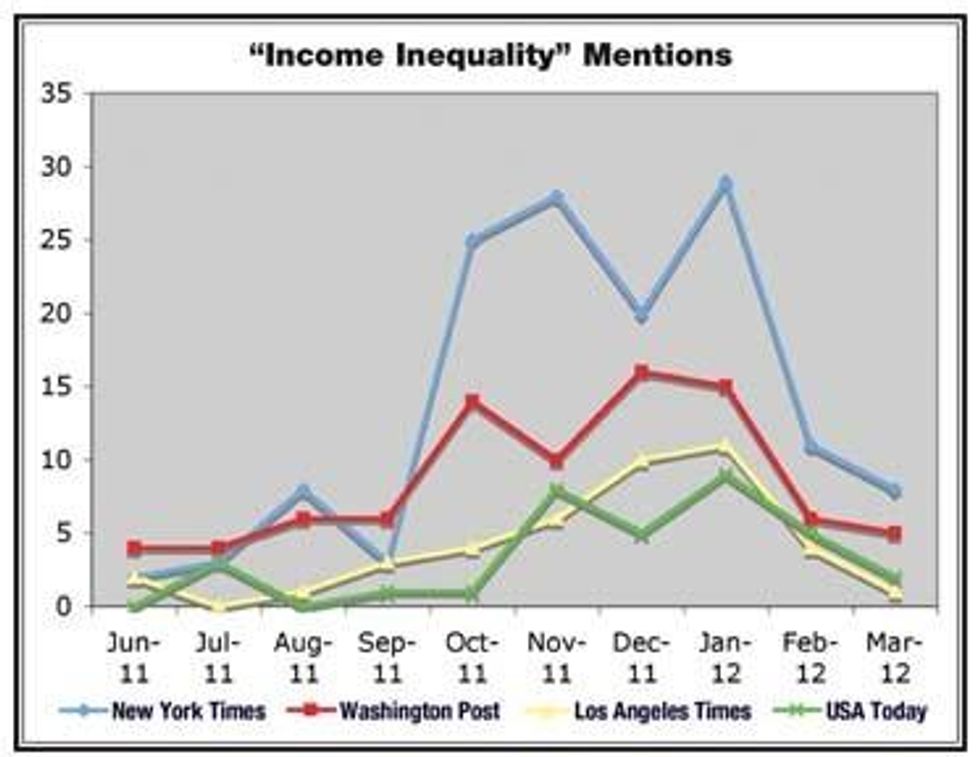

SUBSCRIBE TO OUR FREE NEWSLETTER
Daily news & progressive opinion—funded by the people, not the corporations—delivered straight to your inbox.
5
#000000
#FFFFFF
To donate by check, phone, or other method, see our More Ways to Give page.


Daily news & progressive opinion—funded by the people, not the corporations—delivered straight to your inbox.
Occupy Wall Street is rightly credited with helping to shift the economic debate in America from a fixation on deficits to issues of income inequality, corporate greed and the centralization of wealth among the richest 1 percent. The movement has chalked up other victories as well, from altering New York Gov. Andrew Cuomo's tax plan (New York Times, 12/5/11) to re-energizing activists and unions, but bringing some discussion of class into the mainstream dialogue has been one of its crowning achievements.
As Occupy slowed down for the winter, though, would corporate media continue to talk about our increasingly stratified society without a vibrant protest movement forcing their hand? The answer, unsurprisingly, is no.
As mentions of "Occupy Wall Street" or "Occupy movement" waned in early 2012, so too have mentions of "income inequality" and, to an even greater extent, "corporate greed." The trend is true for four leading papers (New York Times, Washington Post, USA Today, L.A. Times), news programs on the major networks (ABC, CBS, NBC), cable (MSNBC, CNN, Fox News) and NPR, according to searches of the Nexis news media database. Google Trends data also indicates that from January to March, the phrases "income inequality" and "corporate greed" declined in volume of both news stories and searches.
From June 2011 through March 2012, mentions of the phrase "income inequality" in the four papers first increased dramatically, then decreased slightly more slowly. The number of mentions per month ranged from 8 to 15 between June and September. Then in October, when OWS coverage peaked, "income inequality" mentions increased nearly fourfold to 44, and reached 52 mentions in November. January had a total of 64 mentions, though 13 of those stories focused on President Barack Obama's State of the Union address.
By March, there were only 16 mentions of "income inequality," half from the New York Times--which also far outpaced the other papers in coverage of OWS that month, at 45 mentions to the L.A. Times' 12, the Post's 10 and USA Today's three, due in part to the scores arrested in New York City on the movement's six-month anniversary on March 17.


Dear Common Dreams reader, The U.S. is on a fast track to authoritarianism like nothing I've ever seen. Meanwhile, corporate news outlets are utterly capitulating to Trump, twisting their coverage to avoid drawing his ire while lining up to stuff cash in his pockets. That's why I believe that Common Dreams is doing the best and most consequential reporting that we've ever done. Our small but mighty team is a progressive reporting powerhouse, covering the news every day that the corporate media never will. Our mission has always been simple: To inform. To inspire. And to ignite change for the common good. Now here's the key piece that I want all our readers to understand: None of this would be possible without your financial support. That's not just some fundraising cliche. It's the absolute and literal truth. We don't accept corporate advertising and never will. We don't have a paywall because we don't think people should be blocked from critical news based on their ability to pay. Everything we do is funded by the donations of readers like you. Will you donate now to help power the nonprofit, independent reporting of Common Dreams? Thank you for being a vital member of our community. Together, we can keep independent journalism alive when it’s needed most. - Craig Brown, Co-founder |
Occupy Wall Street is rightly credited with helping to shift the economic debate in America from a fixation on deficits to issues of income inequality, corporate greed and the centralization of wealth among the richest 1 percent. The movement has chalked up other victories as well, from altering New York Gov. Andrew Cuomo's tax plan (New York Times, 12/5/11) to re-energizing activists and unions, but bringing some discussion of class into the mainstream dialogue has been one of its crowning achievements.
As Occupy slowed down for the winter, though, would corporate media continue to talk about our increasingly stratified society without a vibrant protest movement forcing their hand? The answer, unsurprisingly, is no.
As mentions of "Occupy Wall Street" or "Occupy movement" waned in early 2012, so too have mentions of "income inequality" and, to an even greater extent, "corporate greed." The trend is true for four leading papers (New York Times, Washington Post, USA Today, L.A. Times), news programs on the major networks (ABC, CBS, NBC), cable (MSNBC, CNN, Fox News) and NPR, according to searches of the Nexis news media database. Google Trends data also indicates that from January to March, the phrases "income inequality" and "corporate greed" declined in volume of both news stories and searches.
From June 2011 through March 2012, mentions of the phrase "income inequality" in the four papers first increased dramatically, then decreased slightly more slowly. The number of mentions per month ranged from 8 to 15 between June and September. Then in October, when OWS coverage peaked, "income inequality" mentions increased nearly fourfold to 44, and reached 52 mentions in November. January had a total of 64 mentions, though 13 of those stories focused on President Barack Obama's State of the Union address.
By March, there were only 16 mentions of "income inequality," half from the New York Times--which also far outpaced the other papers in coverage of OWS that month, at 45 mentions to the L.A. Times' 12, the Post's 10 and USA Today's three, due in part to the scores arrested in New York City on the movement's six-month anniversary on March 17.


Occupy Wall Street is rightly credited with helping to shift the economic debate in America from a fixation on deficits to issues of income inequality, corporate greed and the centralization of wealth among the richest 1 percent. The movement has chalked up other victories as well, from altering New York Gov. Andrew Cuomo's tax plan (New York Times, 12/5/11) to re-energizing activists and unions, but bringing some discussion of class into the mainstream dialogue has been one of its crowning achievements.
As Occupy slowed down for the winter, though, would corporate media continue to talk about our increasingly stratified society without a vibrant protest movement forcing their hand? The answer, unsurprisingly, is no.
As mentions of "Occupy Wall Street" or "Occupy movement" waned in early 2012, so too have mentions of "income inequality" and, to an even greater extent, "corporate greed." The trend is true for four leading papers (New York Times, Washington Post, USA Today, L.A. Times), news programs on the major networks (ABC, CBS, NBC), cable (MSNBC, CNN, Fox News) and NPR, according to searches of the Nexis news media database. Google Trends data also indicates that from January to March, the phrases "income inequality" and "corporate greed" declined in volume of both news stories and searches.
From June 2011 through March 2012, mentions of the phrase "income inequality" in the four papers first increased dramatically, then decreased slightly more slowly. The number of mentions per month ranged from 8 to 15 between June and September. Then in October, when OWS coverage peaked, "income inequality" mentions increased nearly fourfold to 44, and reached 52 mentions in November. January had a total of 64 mentions, though 13 of those stories focused on President Barack Obama's State of the Union address.
By March, there were only 16 mentions of "income inequality," half from the New York Times--which also far outpaced the other papers in coverage of OWS that month, at 45 mentions to the L.A. Times' 12, the Post's 10 and USA Today's three, due in part to the scores arrested in New York City on the movement's six-month anniversary on March 17.

